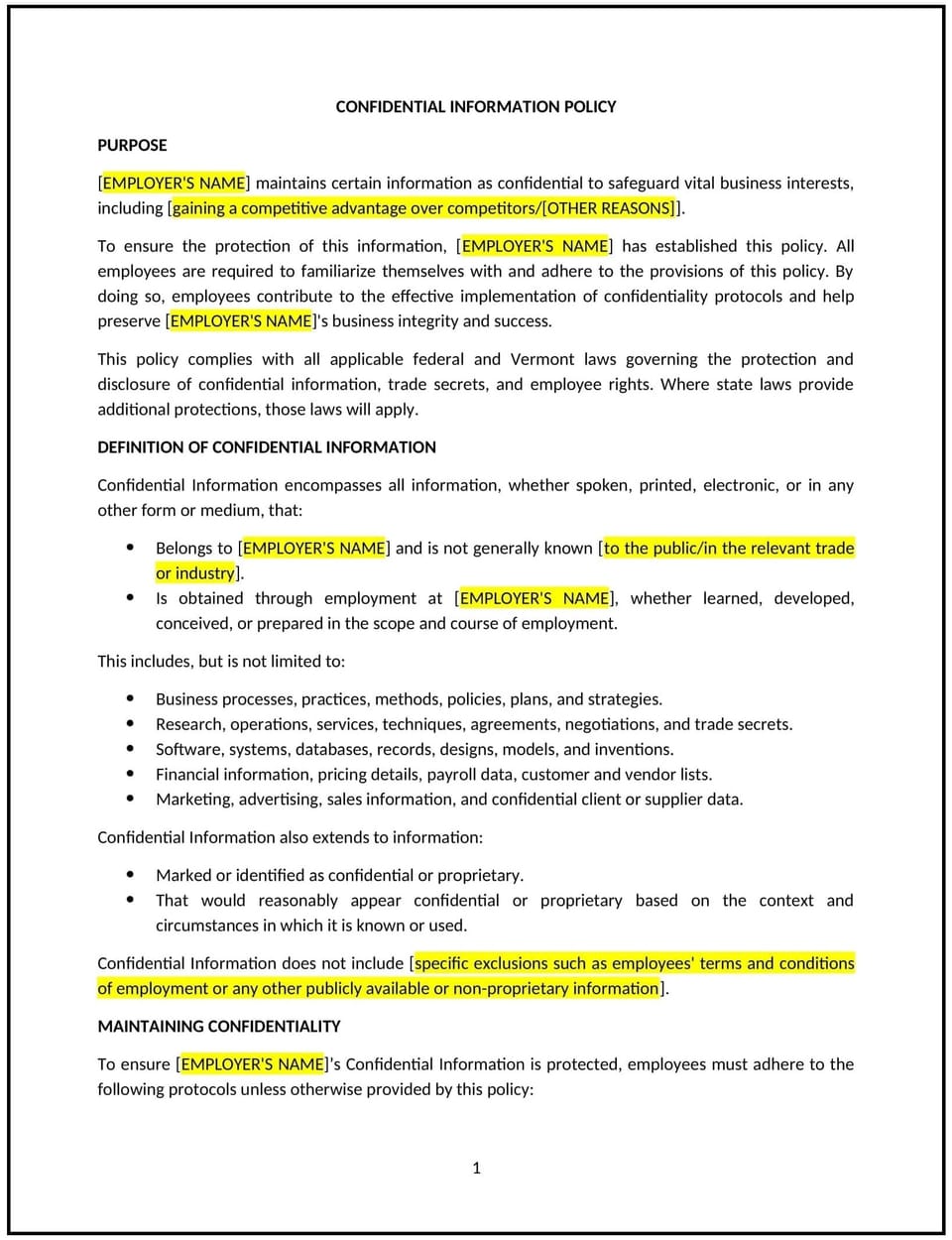Confidential information policy (Vermont): Free template

Confidential information policy (Vermont)
This confidential information policy is designed to help Vermont businesses protect sensitive information and ensure it is handled responsibly. It provides guidelines for managing access, usage, and disclosure of confidential data, aligning with Vermont regulations and best practices.
By adopting this policy, businesses can safeguard their intellectual property, reduce risks, and foster trust with employees, customers, and partners.
How to use this confidential information policy (Vermont)
- Define confidential information: Specify what constitutes confidential data, such as trade secrets, client information, employee records, and proprietary business plans.
- Establish access guidelines: Clarify who is authorized to access confidential information and the procedures for granting, monitoring, and revoking access.
- Address employee responsibilities: Require employees to protect confidential information from unauthorized access, misuse, or disclosure.
- Include third-party requirements: Mandate non-disclosure agreements (NDAs) for vendors, contractors, or other third parties who may access confidential information.
- Specify reporting procedures: Provide steps for employees to report suspected or actual breaches of confidentiality to HR or the compliance team.
- Emphasize consequences: Outline the disciplinary actions for failing to comply with the policy, which may include termination or legal action.
- Monitor compliance: Regularly review access logs, employee adherence, and updates to ensure the policy aligns with Vermont laws and organizational needs.
Benefits of using this confidential information policy (Vermont)
This policy provides several benefits for Vermont businesses:
- Protects sensitive data: Minimizes the risk of data breaches or unauthorized access.
- Supports compliance: Aligns with Vermont laws and industry regulations for data protection.
- Builds trust: Demonstrates a commitment to safeguarding employee, customer, and partner information.
- Mitigates risks: Reduces the likelihood of financial or reputational damage from confidentiality breaches.
- Encourages accountability: Sets clear expectations for employees and third parties regarding the handling of confidential information.
Tips for using this confidential information policy (Vermont)
- Communicate the policy: Ensure employees understand the importance of protecting confidential information and know the specific guidelines.
- Train employees: Provide regular training sessions on handling and safeguarding sensitive data.
- Use security tools: Implement technologies such as encryption, secure access controls, and monitoring systems to protect confidential information.
- Enforce NDAs: Require third parties to sign NDAs before accessing sensitive company information.
- Update regularly: Revise the policy to reflect changes in Vermont laws, technology, or organizational practices.
Q: What is classified as confidential information under this policy?
A: Confidential information includes trade secrets, customer data, employee records, financial documents, and proprietary business strategies, among other sensitive materials.
Q: Who has access to confidential information?
A: Access is restricted to employees and authorized third parties with a legitimate business need, as defined by the policy.
Q: What happens if confidential information is mishandled?
A: Mishandling confidential information may lead to disciplinary actions, including termination or legal consequences, based on the severity of the incident.
Q: Are third parties subject to this policy?
A: Yes, third parties such as contractors or vendors must comply with this policy and sign NDAs before accessing confidential data.
Q: How should employees report a breach of confidentiality?
A: Employees should report suspected or actual breaches immediately to HR or the compliance officer, following the steps outlined in this policy.
Q: Is training on confidentiality mandatory?
A: Yes, all employees are required to complete training on protecting and handling confidential information securely.
Q: How often is this policy reviewed?
A: This policy is reviewed annually or whenever significant changes occur in Vermont laws, business practices, or security protocols.
Q: What tools are used to protect electronic confidential information?
A: Encryption, secure passwords, access control systems, and monitoring tools are commonly used to safeguard electronic confidential data.
This article contains general legal information and does not contain legal advice. Cobrief is not a law firm or a substitute for an attorney or law firm. The law is complex and changes often. For legal advice, please ask a lawyer.


